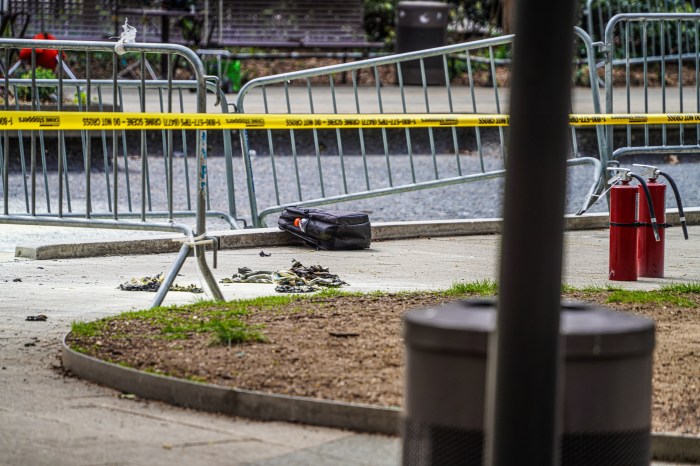A Gay Iranian’s ordeal at the hands of the fundamentalist sex police
The experiences of a 25-year-old gay Iranian from Shiraz are typical of the repression suffered by ordinary gay men there. The young man chose the pseudonym Nima to protect himself.
Throughout the interview, Nima referred repeatedly to the basiji—the thuggish Iranian parapolice who operate under the authority of the ayatollahs and the Iranian Ministry of the Interior. They are recruited from the criminal and unemployed underclasses, many of them in their late teens and early 20s, and are commanded by senior figures who are veterans of the late Ayatollah Khomeini’s Revolutionary Guards. The basiji are deployed by the government as its sex police, spearheading the lethal anti-gay pogrom that continues in Iran, and which has been reported on extensively in this newspaper.
“I’ve been beaten up and arrested several times, and been under severe pressure, and I’ve got to the point that I’m getting tired of being alive!” Nima told Gay City News in an interview conducted this week with the assistance of a Persian-speaking translator. “I’m gay and I don’t have any problem with my sexuality. But people and government have a problem with me as being gay. Why?”
Nima continued, “I got my diploma in computer science and am working in a computer design company now. I’m from a middle class family and we live moderately.
“My first arrest was as a result of my hair. This took place in April 2002 when I was 21. The basiji accused me of designing my hair like the ‘fags’—so they took me for 24 hours to a detention center for their Basiji Branch Number One, beat me, and forced me to promise not ever have a faggot-shaped haircut again. Then they released me.”
Nima’s most recent arrest occurred this March when he was caught up in the Iranian government’s massive Internet entrapment campaign, in which younger, attractive basiji are sent into Internet chatrooms as moles to entrap gay men seeking companionship.
“I was chatting on the Internet with someone and arranged a meeting in Ghasroldasht Square, where I was arrested and taken to basiji headquarters,” Nima said. “They beat me up the entire day, lecturing me that if I confess that I’m gay, they will release me. But I knew the outcome of my confession would be a death sentence, so I never uttered a word. I just told them, ‘I’m curious to know who these gay people are.’ Then they beat me again and took me outside the city and left me in a the middle of some ruins—and I didn’t know were I was.”
On a third occasion a year ago in May, Nima was arrested by a basiji patrol on bicycles because he “looked gay.”
“The basiji took me to a place like a mosque which was their operational base, stuck a gun in my face, and said, ‘Sign these papers, confessing that you are gay, or we will kill you right away,’” Nima said. “I cried and begged them not to kill me. At the end, one of them said, ‘If you want to stay alive and not be reported to the authorities as such a filthy person, you must have sex with me.’ Then he raped me right there, and then dragged me to a car and took me to the outskirts of the city, then kicked me out of the car and trampled me viciously while I was lying on the ground.”
Arsham Parsi, human rights secretary of the Persian Gay and Lesbian Organization (PGLO), who provided the contact with Nima, told Gay City News, “Nima is a friend of mine, and his experience is so typical of what happens every day to gay Iranians. Many gay Iranians are, like Nima, in despair at the hostile and menacing and lethal environment they face, when they can be arrested at any moment and their lives are at risk because of who they are and how they love.”
Parsi spoke to Gay City News from Toronto—he was only recently granted political asylum in Canada—and reiterated the PGLO’s support for the July 19 International Day of Action Against Homophobic Persecution in Iran, for which demonstrations and events have been organized in 20 cities around the world, including New York City.
“Actions like these in support of gay Iranians are tremendously important and effective,” Parsi said. “So many gay Iranians think they are alone, that nobody cares about them. The government and the ayatollahs tell them they are ‘sick’ and that they are criminals. Gay Iranians live in a terrible isolation. So when gay Iranians hear about protests in the world outside Iran on their behalf, it gives warms their hearts and gives them hope, it helps them overcome the feelings of isolation and self-hate which they are taught by the dominant forces in Iran.
“We, gay Iranians, continue to reach out our hands to you—do not leave us alone! Please continue your efforts to speak up for us whose voices are stilled by our government. I hope many gay New Yorkers will join the July 19 demonstration in your city. When you do, know that your cry of protest will be heard inside Iran, and that it can help save gay Iranians from the kind of despair that can drive them to suicide. It can help make our people less afraid and ashamed of who they are. ”
The July 19 demonstration in New York will be held at 5 p.m. next Wednesday at the Iranian Mission to the United Nations, 622 Third Avenue at 40th Street, and is organized by the International Gay and Human Rights Commission.
DOUG IRELAND can be reached through his blog, DIRELAND, at http://direland. typepad.com/direland/.
gaycitynews.com


































